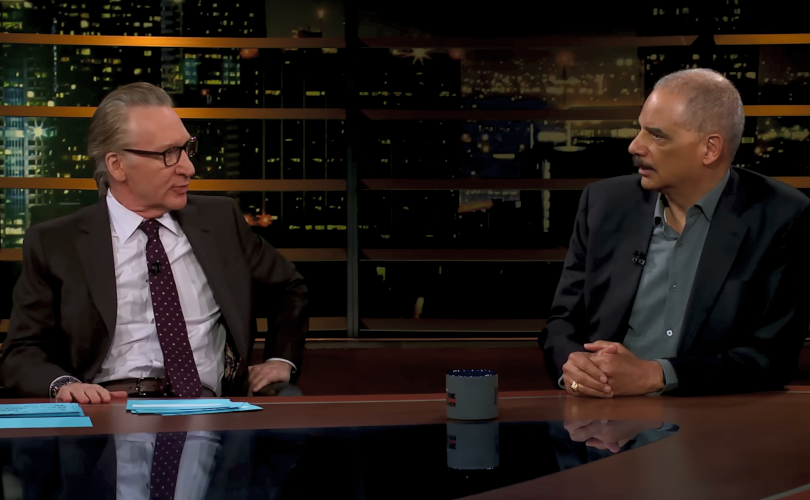(LifeSiteNews) — Former Obama administration Attorney General Eric Holder received pushback over the weekend on the prevailing left-wing narrative that election integrity reform amounts to racist “voter suppression” from an unexpected source: liberal HBO host Bill Maher.
Maher, a longtime liberal personality whose independent streak has occasionally put him at odds with the extremes of his own side, had Holder on the Friday edition of his show Real Time, where he challenged the divisive figure for his vocal criticism of state laws requiring photo identification be presented in order to vote.
“But photo IDs are popular even among African-Americans. Something like three quarters of whites. And I think 69% of Black folks say, yeah, we should have photo IDs. So why is that an issue?” Maher asked. Polls consistently show that overwhelming majorities of Americans favor requiring photo identification to vote, across partisan and racial lines.
Holder claimed that Texas was “trying to fool around with” photo ID requirements by citing the fact that a state handgun license is among the Texas’s acceptable forms of voter identification but a University of Texas student ID is not; Holder neglected to acknowledge that students enrolled at a university are not necessarily residents of the state in which it is located.
Maher responded by pointing out that after Georgia enacted its photo ID requirement for voting, which President Joe Biden called Jim Crow 2.0 in an attempt to liken it to racial segregation, “the vote went up, including among African-Americans,” despite persistent claims that it would suppress minority turnout. “How do you square that?”
Acceptable forms of photo ID for Georgia elections include current or expired driver’s licenses, student IDs, passports, and more, and those who lack any of them can obtain a state-issued photo ID free of charge. Instead of attempting to explain how such requirements are burdensome to black Americans, Holder claimed that the lack of an actual suppressive effect was simply a “testament to the fact that black folks have said no matter what impediments you put in front of us, we’re going to the polls.”
“The question you have to ask the Georgia legislature is why did you put them in place in the first place, having done an election that everybody said was fair, why did you then have to put these other provisions in place?” the former Obama AG added. “Among them, you can’t give people who are waiting in line water or food and you figure, what’s that all about? Well, it turns out in Atlanta, 2020, election same night. If you’re African-American, you wait 51 minutes to vote. If you’re white, same place, Atlanta, same election, you wait six minutes to vote. So you get to see what’s behind some of the stuff they’ve done.”
In 2021, even the left-wing Washington Post slammed Biden with its notorious “Four Pinocchios” rating for similar claims against the Georgia law, which actually expanded early voting hours, requires heavily-attended precincts to monitor voting wait times and add voting machines if necessary to reduce voting times, and did not prohibit voters from being given water, but instead said merely that food and drink cannot be used to attempt to solicit votes outside of polling places.
Democrats, who have long opposed most election integrity measures, have occasionally fallen victim to mixed messaging on the subject of voter ID when their interests have shifted. In February 2018, for example, the Democrat Party of Wisconsin admitted that “getting a photo ID is free and easy” in urging people to turn out for the state Supreme Court race. Years later, in the wake of the COVID-19 outbreak, numerous left-wing officials such as District of Columbia Mayor Muriel Bowser spoke openly about requiring residents to carry photo ID along with proof of vaccination simply to go out in public.
In 2018, conservative videographer Ami Horowitz interviewed white liberals in Berkeley, California, who explained why they believed black Americans were generally incapable of procuring photo ID, then relayed those views to black residents of Harlem, New York. The latter group found the former group’s assumptions absurd and insulting.

